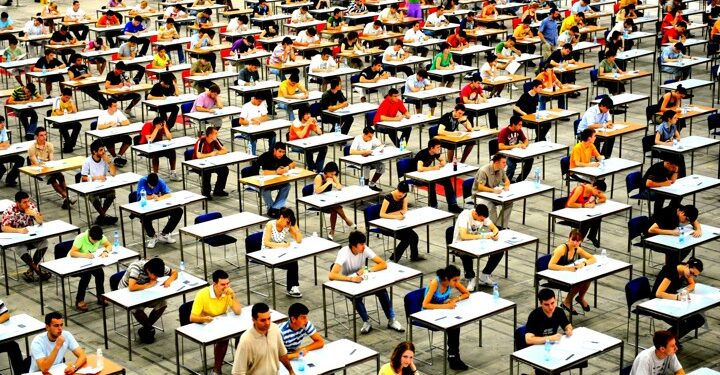This article explores the future of standardized testing and assessment, considering the ongoing debates around its effectiveness and impact on student learning. With the advent of technological advancements and the changing needs of the workforce, it is necessary to re-evaluate the role of standardized tests in the education system.
Standardized testing has been a cornerstone of the American education system for decades. In recent years, however, there has been a growing debate about the effectiveness of such testing in promoting student learning and development.
Critics argue that standardized testing creates an unnecessary burden on students and teachers, leading to a narrow focus on test preparation at the expense of more well-rounded educational experiences. Supporters of standardized testing, on the other hand, argue that it is necessary for ensuring accountability and measuring student progress.
As we look to the future, it is important to consider the role that standardized testing will play in education. With the advent of new technologies and changing workforce needs, we must ask ourselves whether traditional standardized tests are the best way to measure student achievement and success. In this article, we will explore the current state of standardized testing, the challenges it faces, and potential alternatives for the future.
The Current State of Standardized Testing:

Standardized testing has been a fixture in American education since the early 20th century. The first standardized test was developed in 1914 by psychologist Lewis Terman, who created the Stanford-Binet Intelligence Scale to measure children’s intelligence. Since then, standardized tests have been used to measure everything from basic skills to college readiness.
Today, standardized testing is an integral part of the American education system. Students are required to take standardized tests at various stages of their education, from elementary school through college. These tests are used to measure student achievement and progress, as well as to evaluate the effectiveness of teachers and schools.
Challenges Facing Standardized Testing:
Despite its long history and widespread use, standardized testing faces a number of challenges in the modern education system.
One of the most significant challenges is the narrow focus that standardized testing can create. Because tests are designed to measure specific skills and knowledge, teachers may feel pressure to teach only to the test, neglecting other important aspects of student learning.
Another challenge facing standardized testing is the impact it can have on students’ well-being. High-stakes tests can create a great deal of stress and anxiety for students, leading to a negative impact on their mental health and overall well-being.
Additionally, some students may not perform well on standardized tests due to cultural or linguistic differences, leading to unfair and inaccurate assessments of their abilities.
Alternatives to Standardized Testing:
Given the challenges facing standardized testing, it is worth considering potential alternatives for measuring student achievement and progress. One such alternative is performance-based assessment, which involves evaluating students’ ability to apply knowledge and skills in real-world contexts.
This type of assessment can be more engaging and meaningful for students, as it focuses on practical applications of knowledge rather than rote memorization.
Another alternative to standardized testing is the use of digital badges, which are visual representations of a student’s achievements and skills.
Digital badges can be earned for a wide range of accomplishments, from mastering a particular skill to completing a project or demonstrating leadership abilities. These badges can be used to demonstrate a student’s competencies to potential employers or higher education institutions.
The Role of Technology in Assessment:
As we look to the future of assessment, it is clear that technology will play an increasingly important role. Online assessments, for example, can provide more timely and accurate feedback to students and teachers, allowing for more targeted instruction and support.
Additionally, artificial intelligence and machine learning can be used to personalize assessments for individual students, providing a more tailored and effective learning experience.
However, the use of technology in assessment also raises concerns about privacy and security. As more assessments are conducted online, it is essential to ensure that student data is protected and that assessments are conducted in a secure environment.
Additionally, the use of artificial intelligence in assessment raises questions about bias and fairness. It is important to ensure that assessments are designed in a way that is fair and unbiased, and that they do not reinforce existing social and economic inequities.
The Future of Assessment:
As we look to the future of assessment, it is clear that there is no one-size-fits-all solution. Different types of assessment may be more appropriate for different contexts and purposes.

However, it is likely that traditional standardized tests will continue to be a part of the education landscape for the foreseeable future. Therefore, it is important to continue to improve and refine these tests, making them more effective, fair, and equitable.
One way to improve standardized tests is to ensure that they are aligned with the skills and knowledge that students will need in the 21st-century workforce. This may involve rethinking the content and format of tests, and incorporating more real-world scenarios and problem-solving tasks.
Additionally, it may be necessary to revise the ways in which tests are scored and interpreted, to ensure that they accurately reflect students’ abilities and potential.
Another way to improve standardized tests is to reduce their negative impact on students’ well-being. This may involve providing more support and resources for students, such as counseling services and stress management techniques.
It may also involve reducing the frequency and intensity of testing, and ensuring that tests are administered in a low-stakes environment.
Conclusion:
In conclusion, the future of standardized testing and assessment is uncertain, but it is clear that change is needed. With the advent of new technologies and changing workforce needs, it is necessary to re-evaluate the role of standardized tests in the education system.
While there is no one-size-fits-all solution, there are a number of potential alternatives to traditional standardized tests that may be more effective, fair, and equitable. By continuing to refine and improve the ways in which we measure student achievement and progress, we can ensure that all students have the opportunity to succeed and thrive in the 21st century.









